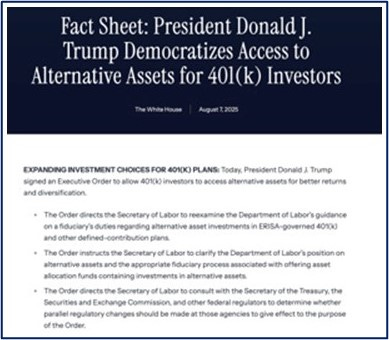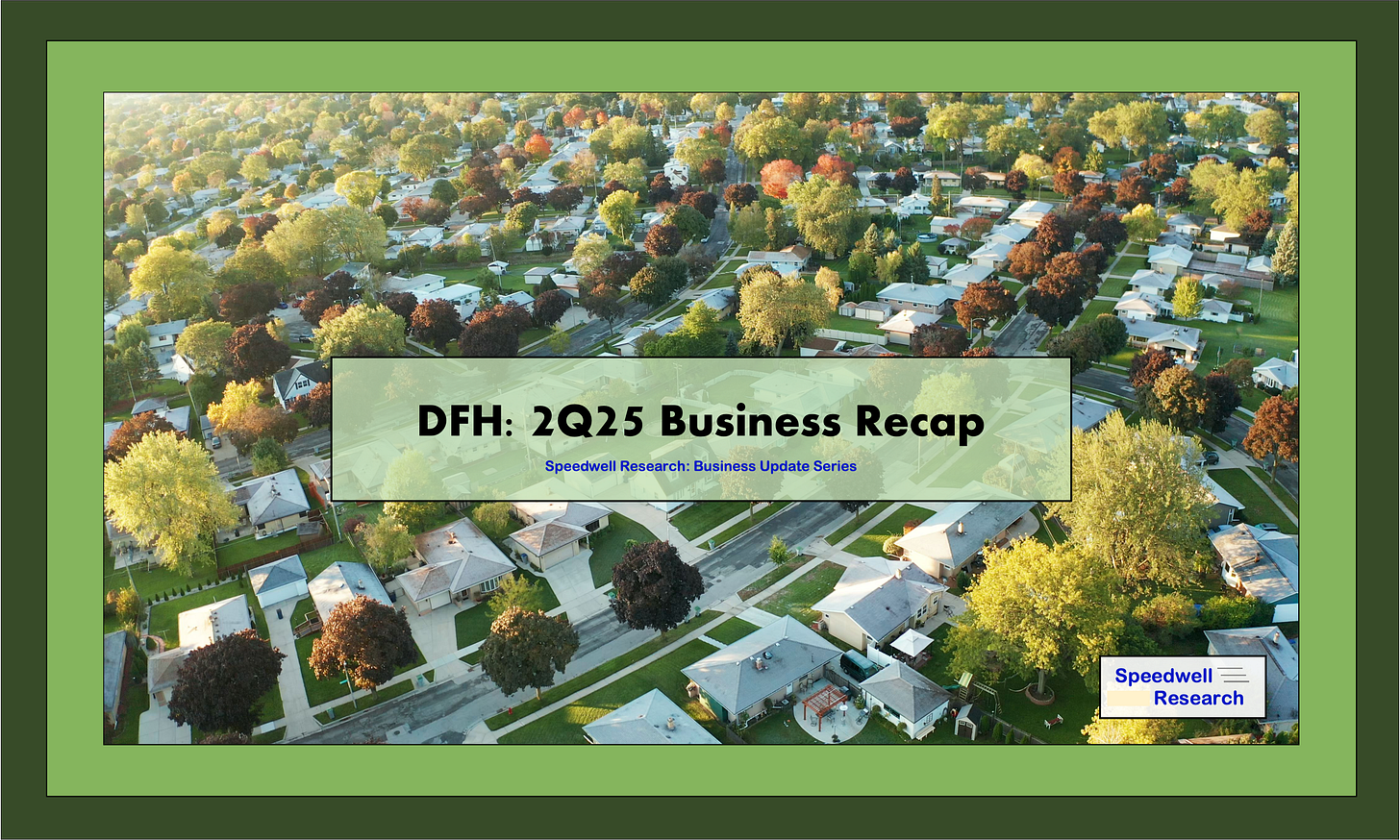The Investor's Briefing #2
Tech's Tariff Exemption, Duolingo Soars & Snapchat Slips, Crypto in 401(k)s, Fed Shake-up
Welcome to Speedwell Research’s Newsletter. We write about business and investing. Our paid research product can be found at SpeedwellResearch.com. You can learn more about us here.
This is a weekly briefing, where we summarize key financial news in the week and recent content you may have missed.
Welcome to the second edition of our new weekly newsletter: The Investor’s Briefing.
In Financial News.
Despite trade policy uncertainty dominating headlines, the S&P 500 neared all-time highs with a +1.9% gain this week, driven by strength in tech and growth names, offset by weakness in healthcare. The tech-heavy Nasdaq index was up even more at +2.9% for the week, notching a record close as investors’ capital continues to flow into high-growth technology names. Shopify and Palantir were up +24% and +18%, respectively. Apple (+12% this week) and semiconductor stocks led the advance, aided by a newly announced tariff exemptions for companies that commit to increasing U.S. production capacity.
On Wednesday, President Trump unveiled sweeping new tariffs on goods from over 90 U.S. trading partners. Most notable was President Trump’s proposed 100% tariffs on foreign-made semiconductors. While broad-based in scope, the measures included targeted exemptions for companies already building or pledging to build domestic production. Apple shares rallied on news that its $100bn U.S. manufacturing plans would avoid the harshest duties, while Nvidia, TSMC, and Broadcom also advanced on the perception their operations would be spared from further trade shocks. Just as it looked like Intel, who has a U.S. heavy manufacturing footprint, would catch a break, the President called for Intel CEO Lip-Bu Tan’s resignation because of alledged connections to China stemming from semiconductor investments with Chinese involvement.
In other news, President Trump signed an executive order to allow crypto and private assets in 401(k) plans. This is a big moment for crypto advocates as it will grant them the ability to tap into trillions of dollars of American retirement savings. It also could be a cause for concern as investor protections in crypto are sparse. Crypto bulls may be expecting something similar to what happened after 1974 when The Employee Retirement Income Security Act was passed and that allowed the inclusion of small cap stocks in pension plans. (Interestingly, some academics point to this act as the reason why small cap stocks outperformed large cap stocks for a 9 year window starting in 1974. The small cap stock performance premium effectively disappears if you pull out this impact).
The inclusion of private assets in 401(k) plans is also a win for Private Equity funds. While the lack of accessibility of retirement funds and long-term nature may make it seem like it is a good source for private investment, the complexity and paperwork involved in offering small dollar partnerships may make this less attractive.
On the monetary policy front, the White House confirmed that Stephen Miran, a close economic adviser to President Trump, will be nominated to the Federal Reserve Board of Governors. Miran’s confirmation won’t occur until after the Fed’s September meeting. However, Miran is widely viewed as favoring pro-growth and accommodative monetary policy, aligning with the administration’s desire for lower interest rates. This development reinforced market expectations for a September rate cut, especially in light of softer labor market data and ongoing trade-related uncertainty. The probability of a September rate cut increased to 92% from 83%. The decisions may hinge on August jobs data. If the labor market continues to soften and the unemployment rate moves up over 4.4%, a larger cut may be on the table. The combination of a potentially more dovish Fed and targeted trade protections for select industries has provided a supportive floor for U.S. equities.
With news that Treasury Secretary Scott Bessent was ruled out as a candidate for Powell’s replacement, there are now 4 leading candidates that President Trump may nominate for the role of Fed Chair. In the running are National Economic Council (NEC) Director Kevin Hassett, former Fed Governor Kevin Warsh, and current Fed Governors Christopher Waller and Michelle Bowman. All of which are in favor of President Trump’s appeal to lower interest rates.
Company News.
One of the best ways to understand what’s going on in the economy is to understand what’s going on with individual businesses.
Shopify reported earnings, and the stock popped 20% as the CFO noted that the tariff hit didn’t materialize. Revenues and GMV were both up +31% with GMV now at $87.8bn. They currently trade at 16x revenues or 100x earnings. However, their operating margins are just 15% today, whereas most top software companies at maturity can acheive 30-40%.
McDonald’s saw U.S. sales rebound in 2Q25, up 5.4%, led by marketing promotions and higher average ticket sales. This follows two quarters of negative growth. They currently trade at 24x forward earnings.
Apple shares were positive +6% after CEO Tim Cook announced a $100bn U.S. investment, which exempted them from Trump’s new tariffs on foreign chips.
Disney earnings topped expectations as streaming and parks offset traditional linear TV losses.
Honda Motors’ profits fell -50% due to U.S. auto tariffs on vehicles. Honda estimated that the 25% tariff on Japanese vehicle exports will cost them over $3bn.
Snapchat plunged 15% after reporting weak 2Q revenue of +9% y/y, citing a glitch that occurred on the ad platform, which led to lower than expected ad auction prices.
Many early social media investors were proponents of the idea that as long as you have users who love your product, you will eventually be able to monetize it… Snapchat is proving to be the counterfactual. Despite being almost 15 years old and having a global user base that numbers almost 1 billion, they still have yet to reach profitability… and you can’t exactly say they are investing in growth either. When Facebook was 15 years old they were minting over $5bn a quarter, SnapChat in contrast is losing >$250mn. While Snapchat has strong user retention, daily usage, and timespent, their global ARPU sits at just $2.86 versus Meta at $13.65. This gap may never close though because it isn’t just about superior ad tech and a larger advertiser base, but also how people use the product. Some services may just lend themselves better to advertising than others.
Arista Networks jumped 18% on robust demand for AI and Cloud networking solutions. Their CEO noted they are positioned to achieve $10bn in revenue by 2026, 2 years ahead of their prior target. This is up from $2.3bn just 6 years earlier in 2020. They currently have a $175bn market cap and trade at 17.5x sales or 56x forward earnings.
Arista is one of the lesser mentioned beneficiaries of the AI spending boom. As a maker of network switches with a software-layer that improves data center efficiency, they were well placed when data center spend exploded. (Part of the “AI Picks and Shovels” strategy William de Gale employeed).
Duolingo reported earnings and the stock popped +30% on surging revenues of +41% y/y as new AI features drove revenue growth. While it gave up about half of those gains over the next few days, they still sport a market cap of $17bn against LTM revenues of $885mn, giving them a 19x sales multiple.
Optimistic investors are increasingly looking at Duolingo as the interface people will use to not just learn langauages, but for any education. They are bullish that as AI improves, their content will improve, increasing engagement and paying users. On the other hand there’s Chegg, who was decimated by ChatGPT and is down -99% from peak. Students quickly learned they could do the same thing on any LLM—and for free. One fundamental difference between the two is the interface. ChatGPT was easier to use than Chegg and was better suited to explain concepts. Duolingo investors have to hope that their app continues to be a more fun and entertaining way to learn than from say an AI-agent or a more immersive Gen-AI experience. There is also the fact that Duolingo is trying to build a habit with 47mn DAUs vs Chegg being more like a tool that you forget about once you solve your problem.
The Trade Desk fell -37% after reporting 2Q results and warned that new tariffs were limiting big advertiser spending.
Eli Lilly shares dropped -14% after disappointing results from its experimental oral weight loss drug, orforglipron, despite reporting robust 2Q earnings and raising guidance for the year.
Appfolio dropped -5.5% on Friday on news that three members of the board of directors resigned. Their cited reason was the perception of a potential conflict on interest as all three are pursuing an opportunity that would be a future customer of AppFolio. They noted that they will remain to be significant shareholders.
We are experimenting with new content formats, so if you enjoyed this summary, please drop a comment or like so we know to keep doing it in the future! Feedback welcomed.
Spotlight.
This week, we released a business update on Coupang and a business recap on DFH.
This is in addition to the 5 other 2Q25 business updates we shared so far this earnings season. We have released business updates on Meta, Api Group, Floor & Decor, AppFolio, and CoStar Group.
Become a Speedwell Research Member to gain access to all extended versions of all of our updates, as well as our library of in-depth research reports! Click here to learn more.
Below are select quotes from our most recent business updates & recaps
CPNG 2Q25 Business Update.
Finding Product Market Fit in Taiwan: “Our Taiwan offering is growing faster and stronger than even the most optimistic forecasts we set at the beginning of the year.” This quarter they experienced +54% q/q growth, almost twice the run-rate at the end of 2024. Y/y growth was triple digits, and they expect it to accelerate in 3Q.”
Read the full update here: Coupang 2Q25 Business Update
DFH 2Q25 Business Recap.
Acquisition Reliant: “Without the closing of the Liberty Communities acquisition, which increased home closing by 179 in the quarter, revenues would have contracted slightly y/y. This exemplifies how acquisitions have been key to helping DFH grow through this very challenging housing market.”
Read the full update here: DFH 2Q25 Business Recap
The Synopsis Podcast.
This week, we released a dialogue episode discussing our new business updates on Floor & Decor and Meta. We expand on calculating the ROIC for AI spend for Meta as well as FND’s new mature store unit economics. Listen below!
Memo of The Week.
From Private to Public Markets: The Detrimental Impact of Investors’ Expectations
Going public changes a company’s environment by shifting from visionary private investors to public shareholders whose sentiment can sway the business. In public markets, stock prices impact morale, strategy, and investor expectations. During market booms, investors may push unrealistic growth narratives, leading management to overpromise or pursue risky ventures. The best defense is to set tempered, cash flow–based expectations to attract patient, long-term investors and avoid becoming hostage to market whims.
Read the full memo here: From Private to Public Markets: The Detrimental Impact of Investors’ Expectations
Company Report Snippet: RH
RH International Expansion: “There are risks with any sort of expansion, especially when it comes to an American company trying to sell luxury to Europeans—there’s no precedent. (Virtually all high-end luxury brands come from Europe). However, it is hard to deny that what RH is building is unique, and it is difficult to see it not appealing to some segment of affluent consumers.”
*This is an excerpt from our company report on RH.
If you are a Speedwell Research Member, read the full report here: RH
If you are not already a Speedwell Research member, you can purchase it here: RH Individual Report
Upcoming.
Research
Current report in progress: LVMH
Coverage
We will be sharing updates on AXON, PRM, and CSU for 2Q25 earnings.
For our latest updates on these names, click here → Business Updates
If you enjoyed this investor’s brief, subscribe so that you don’t miss a single update!
Sharing Links.
Check out Speedwell Research’s Drew Cohen’s YouTube Channel. It is focused on general investing and business content.
Other Links.
A Letter a Day: Ted Weschler (2022) Working With Warren Buffett and the Future of Investments (link)
Chuck Akre: The Bottom Line of All Investing is Rate of Return (link)
Aswath Damodaran: Country Risk 2025 -The Story behind the Numbers (link)
And a special thank you to Matthew Harbaugh for helping put this weekly recap together!
The Synopsis Podcast.
Follow our Podcast below. We have four episode formats: “company” episodes that breakdown in-depth each business we write a report on, “dialogue” episodes that cover various business and investing topics, “article” episodes where we read our weekly memos, and “interviews”.
Speedwell Research Reports.
Become a Speedwell Research Member to receive all of our in-depth research reports, shorter exploratory reports, updates, and Members Plus also receive Excels.
(Many members have gotten their memberships expensed. If you need us to talk with your compliance department to become an approved vendor, please reach out at info@speedwellresearch.com).














Really like how you frame this around principles instead of just chasing a niche. In investing, I’ve found the same applies — if you anchor your portfolio to a clear standard (risk tolerance, quality criteria, long-term vision), you naturally attract better opportunities and avoid chasing the noise.
Love these!